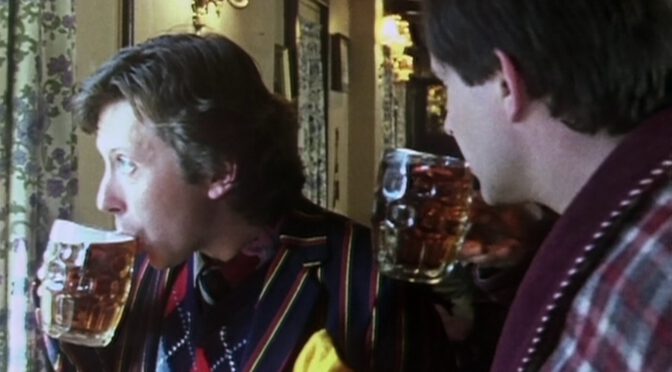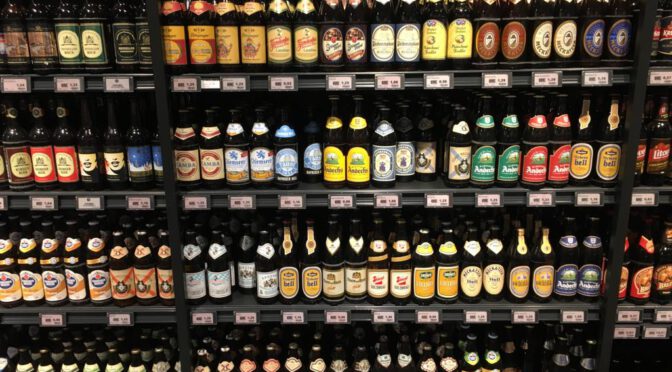For the May 2025 edition of The Session, Phil Cook invited us to write about beer and pubs in art and fiction. This is my contribution to it (spoiler alert: plot details of The Hitchhiker’s Guide To The Galaxy will be discussed).
“Six pints of bitter,” said Ford Prefect to the barman of the Horse and Groom. “And quickly please, the world’s about to end.”
One of the more influential works in science fiction for me has been The Hitchhiker’s Guide To The Galaxy by Douglas Adams. I remember watching the BBC mini-series first, in school, in 1999 or 2000, ironically in German class (yes, we watched the German dub), and I have absolutely no idea why our German teacher showed it to us in the first place.
I did purchase the mini-series on DVD a few years later, and I also got an English-language copy of the book including the sequels. Thinking about it, I think I won it as a prize in some nerd competition thing, but I can’t remember exactly. A few years later, I watched the 2005 film version in cinema, and was actually slightly disappointed (I rewatched it since then, and it’s okay). Starting around 2009 or so, I got my hand on a copy of the radio play, so I listened to that on my way to work and back and then relistened to it for literally months. I now actually consider the radio play to be the best rendition.
One scene I vividly remember is Ford Prefect bringing Arthur Dent to the nearest pub, all while Arthur Dent’s house is about the get demolished to build a bypass. Arthur and Ford then proceed to have 3 pints of bitter each as a muscle relaxant and to cushion their system going through the matter transference beam Ford uses to flee onto one of the Vogon ships in Earth orbit shortly before Earth gets destroyed to make way for a hyperspatial express route.
This particular scene was probably my first exposure to British beer culture. Pints, drunk in a pub, poured through a handpump from cask into dimpled mugs. And then them quickly downing 3 pints each, which looked a bit absurd but also somewhat impressive. To refresh my memory for this blog post, I actually rewatched the scene, and there’s obviously been some prop trickery involved, because at some point, Arthur Dent downs two thirds of a pint in about 3 seconds without actually swallowing any meaningful amount of liquid.
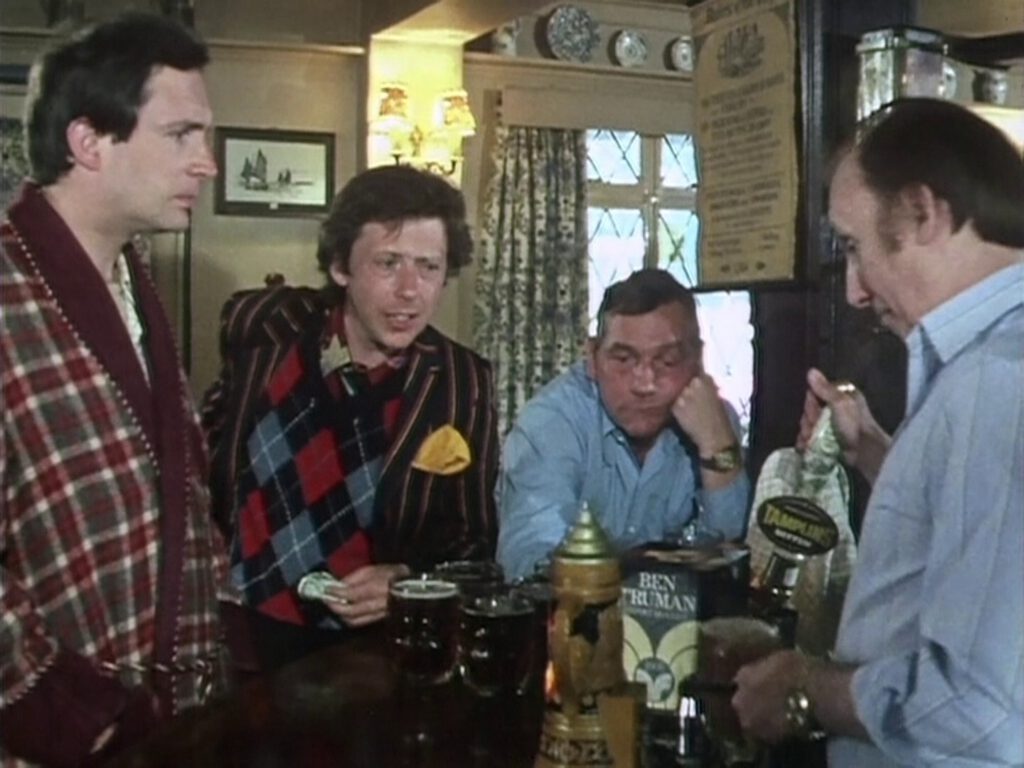
The beer served in the pub (Horse and Groom in the book, Red Lion in the BBC mini-series), at least what’s visible in the TV version (and only because the pump clip was turned sideways, towards the camera), was Tamplins Bitter. Tamplin & Sons was a brewery based in Brighton, founded in 1821. By 1953, Tamplin & Sons had taken over a number of local breweries both in Brighton and nearby Lewes, and owned about 400 pubs, when it itself was acquired Watney, Combe, Reid & Co. The brewery operated for 20 more years, when brewing on site ceased, but the brand Tamplins seems to have stuck around for longer than that. The Brewery History Society has more details.
Another tap that can be seen is what looks like Ben Truman Export Draught, but sadly, no beer is poured from it. I suppose you had to order by name.
Ford slapped a five-pound note on the bar. He said, “Keep the change.”
“What, from a fiver? Thank you sir.”
The book was published in 1979, while the TV series was aired in early 1981. At the time, the average price of a pint of bitter would have been 34p (1979) resp. 49p (1981). Paying for six pints, the change would have been 2 to 3 quid, depending on which year you assume. Consulting the BoE inflation calculator, these pints would have been fairly cheap compared to the beer prices we’re used to today: 34p in 1979 were the equivalent of GBP 1.65 in March 2025, while 49p in 1981 would amount to GBP 1.86 in March 2025.
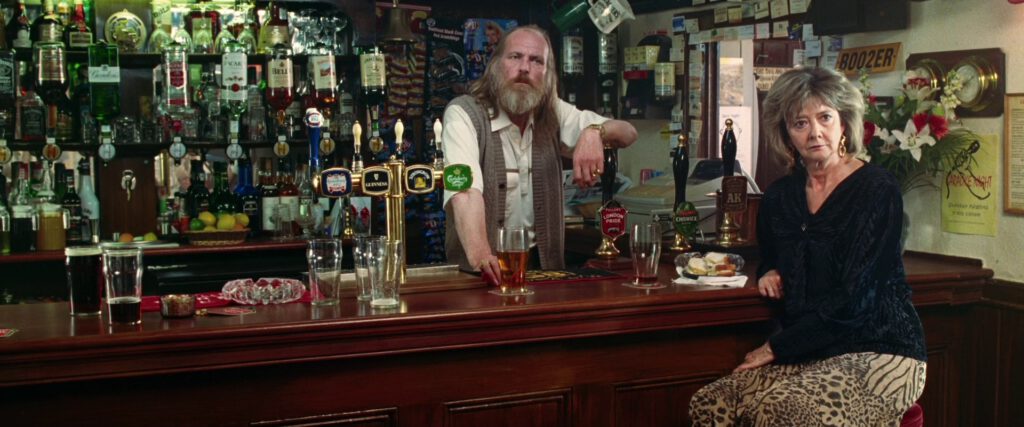
Now let’s compare the TV mini-series with the 2005 film version: there, the choice in beer is much more varied, with Kronenbourg 1664, Guinness, Strongbow (a cider) and Carlsberg available from keg, and three more beers from cask, in particular Fuller’s London Pride, Fuller’s Chiswick Bitter, and one where I can only recognise “AK” on the pump clip (possibly McMullen AK? at least the colour scheme would roughly match up).
Ford Prefect (played by Mos Def) comes in, and in a broad and very rhotic American accent, says “six pints of bitter and quickly, the world’s about to end!”, pays with a 50 pound note, and tells the barman to “keep the change, you got about 10 minutes to spend it”.
Interestingly, the beers that are served to Ford Prefect and Arthur Dent (played by Martin Freeman) are quite inconsistent. The first one Ford quickly downs (and subsequently apologises for) looks like a pale lager, while the first one held by Arthur looks like a dark amber bitter. Two more pints lined up for them are also amber-coloured, but much paler (this may be due to the lighting and/or the red towel they’re stood on, but I’m not 100% sure). And worst of all, Arthur leaves without drinking a single pint!
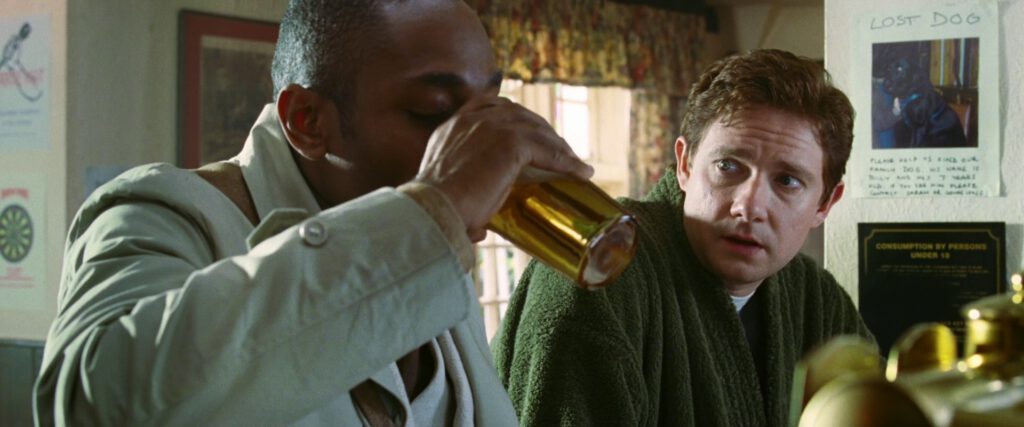
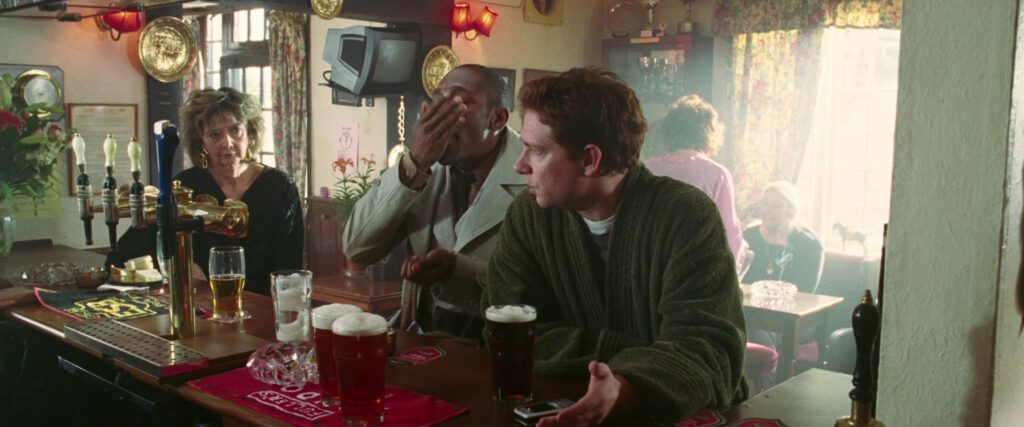
What is going on here? Not just different beers poured when only “six pints of bitter” were ordered (what barman would do that?), but also poured rather inconsistently, with one of them very underpoured, and atypically for the West Country of England. To quote the Simpsons, “Boy, I really hope somebody got fired for that blunder.”
When we look at how much Ford Prefect gave (50 quid), and how much an average pint cost in 2005 when the film was released (GBP 2.13), the tip of presumably GBP 37.22 is even more generous than in the TV series. FWIW, GBP 2.13 in 2005 are GBP 3.71 in today’s (well, March 2025) money. On top of that, Ford also pays for “a round of drinks for everyone, on me.”
Bonus: before going to the pub (for which no specific name is used in the 2005 film version), Ford Prefect bribes the construction workers with cans of John Smith Extra Smooth, bottles of Cobra and packs of peanuts (which he seems to have brought for himself and Arthur) to temporarily halt the demolition work.
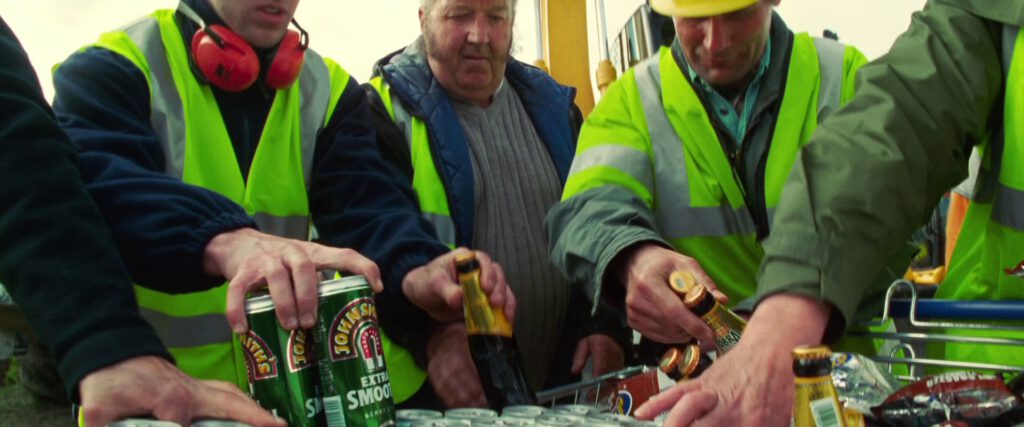
They still knock down Arthur’s house within minutes, foreshadowing the inevitability of Earth’s destruction in a few more minute’s time.
That said, I’d rather have a pint of Tamplin’s or Chiswick Bitter than a Pan-Galactic Gargle Blaster, supposedly the “best drink in existence”, the effect of which is “like having your brain smashed out by a slice of lemon wrapped around a large gold brick.”

